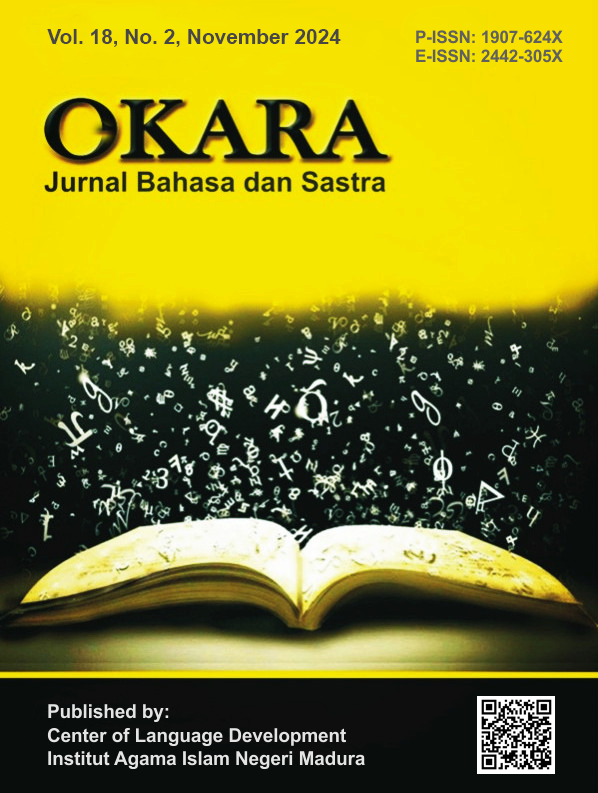
OKARA: Jurnal Bahasa dan Sastra or Journal of Languages and Literature (P-ISSN: 1907-624X and E-ISSN: 2442-305X) is a peer-reviewed journal published biannually by the Center of Language Development of Institut Agama Islam Negeri (IAIN) Madura, in collaboration with ELITE Association Indonesia. Accredited "Rank 2 (SINTA 2)" by the Directorate General of Higher Education, Research, and Technology of the Republic of Indonesia under Decree No. 164/E/KPT/2021.
The journal publishes original research between practical studies and literature reviews on current issues in linguistics, literature, and language teaching. It especially welcomes perspectives from ASEAN and Southeast Asian communities and across the globe. The focus and scopes of the journal include but are not limited to micro linguistics and interdisciplinary studies on languages, literature related to intrinsic and extrinsic elements, language teaching/ learning that offers significant impacts, and pragmatic teaching approaches.
This journal is an open-access journal, which means that all content is freely available without any charge to the user(s) or his/her institution. Users are allowed to read, download, copy, distribute, print, search, or link to the full texts of the articles or use them for any other lawful purpose without asking prior permission from the publisher or the author.
OKARA has become a Crossref Member since 2015. Therefore, all articles published by OKARA will have unique DOI numbers. OKARA has also been accepted by the ACI (ASEAN Citation Index) steering committee for ACI inclusion on November 1, 2018, and passed the re-evaluation process in September 2023.
Current Issue

This journal issue features a wide range of research contributions from esteemed scholars and practitioners affiliated with distinguished institutions across Asia, Southeast Asia, and beyond. Researchers from Viet Nam National University Ho Chi Minh City, Universiti Brunei Darussalam, Jinan University, Mustafa Kemal University, the University of the Holy Quran and Islamic Sciences, and institutions in Indonesia. The diverse academic backgrounds of the contributors reflect a broad scope of topics, including language education, applied linguistics, Arabic learning, and language-related cultural studies. This edition provides valuable interdisciplinary insights into global and regional perspectives, fostering a deeper understanding of language, culture, and education.
Articles
-
 Abstract views: 388 ,
Abstract views: 388 ,  PDF downloads: 529
PDF downloads: 529
-
 Abstract views: 357 ,
Abstract views: 357 ,  PDF downloads: 295
PDF downloads: 295
-
 Abstract views: 127 ,
Abstract views: 127 ,  PDF downloads: 111
PDF downloads: 111
-
 Abstract views: 302 ,
Abstract views: 302 ,  PDF downloads: 197
PDF downloads: 197
-
 Abstract views: 65 ,
Abstract views: 65 ,  PDF downloads: 42
PDF downloads: 42
-
 Abstract views: 57 ,
Abstract views: 57 ,  PDF downloads: 44
PDF downloads: 44
-
 Abstract views: 39 ,
Abstract views: 39 ,  PDF downloads: 30
PDF downloads: 30




_(1).png)
.png)
.png)
1.png)
.png)
.png)

.png)
_-_Copy_-_Copy.png)





